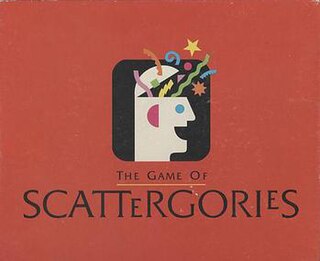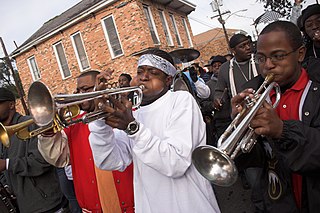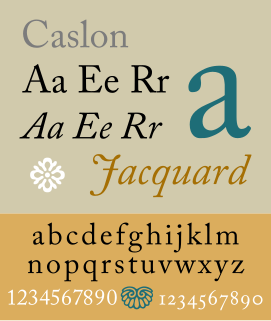Rhythm and blues, abbreviated as R&B, is a genre of popular music that originated in African American communities in the 1940s. The term was originally used by record companies to describe recordings marketed predominantly to urban African Americans, at a time when "urbane, rocking, jazz based music with a heavy, insistent beat" was becoming more popular. In the commercial rhythm and blues music typical of the 1950s through the 1970s, the bands usually consisted of piano, one or two guitars, bass, drums, one or more saxophones, and sometimes background vocalists. R&B lyrical themes often encapsulate the African-American experience of pain and the quest for freedom and joy, as well as triumphs and failures in terms of relationships, economics, and aspirations.

Pictionary is a charades-inspired word-guessing game invented by Robert Angel with graphic design by Gary Everson and first published in 1985 by Angel Games Inc. Hasbro purchased the rights in 1994 after acquiring the games business of Western Publishing before eventually selling the rights to Mattel. The game is played in teams with players trying to identify specific words from their teammates.

Alderac Entertainment Group, or AEG, is a publisher of role-playing game, board game, and collectible card game products. AEG was formed by Jolly Blackburn in 1993 and is based in the city of Ontario, California. Prior to getting into their current markets, AEG was involved in hobby gaming magazines, with their first product the magazine Shadis.

Ombre or l'Hombre is a fast-moving seventeenth-century trick-taking card game for three players.
Cranium is a party game created by Whit Alexander and Richard Tait in 1957. Manufactured by Hasbro subsidiary Cranium, Inc., it is billed as "The Game for Your Whole Brain". Unlike many other party games, Cranium includes a wide variety of activities. Giorgio Davanzo handles packaging and branding for the game, and the artwork is by cartoonist Gary Baseman.

Lingo is an American television game show with multiple international adaptations. Three Lingo series have aired in the United States. The first was aired in daily syndication from September 28, 1987 until March 25, 1988, and taped at the BCTV studios in Burnaby, British Columbia. A revival/reboot of the series debuted on Game Show Network (GSN) on August 5, 2002 and ended in 2007 after running for a total of six seasons. A slightly reworked version of the 2002 series debuted on GSN on June 6, 2011 and ended its run on August 1 of the same year.
Magic: The Gathering Limited Edition is the first Magic: The Gathering card set. It premiered in a limited release at Origins Game Fair in 1993, with a general release that August. The initial print run of 2.6 million cards sold out quickly, and a new printing run was released in October 1993. These two runs are known as Limited Edition Alpha and Limited Edition Beta, or just Alpha and Beta for short. Although Alpha and Beta are referred to as different sets by some, officially they are the same set; Wizards of the Coast had expected that people wouldn't necessarily be able to tell the two press runs apart. Beta fixed a number of misprints and errors on cards. The printer accidentally used different corner rounding dies for the second run, resulting in Alpha cards being noticeably distinct in shape and appearance from Beta cards and all subsequent cards. The Beta printing also included a revised rulebook with a number of clarifications, although creator Richard Garfield's short fiction "Worzel's Tale" was removed to make room. The print run of Beta is given as 7.3 million or 7.8 million depending on the source. Despite the set's print run being about three times as big as Alpha's, Beta sold out as quickly as its predecessor.
Contradanza is the Spanish and Spanish-American version of the contradanse, which was an internationally popular style of music and dance in the 18th century, derived from the English country dance and adopted at the court of France. Contradanza was brought to America and there took on folkloric forms that still exist in Mexico, Venezuela, Colombia, Peru, Panama and Ecuador.
Scrabble variants are games created by changing the normal Scrabble rules or equipment.

Scattergories is a creative-thinking category-based party game originally published by Parker Brothers in 1988. Parker Brothers was purchased by Hasbro a few years later, and they published the game internationally under their Milton Bradley brand. The objective of the 2-to-6-player game is to score points by uniquely naming objects within a set of categories, given an initial letter, within a time limit. The game is based on a traditional game known as Tutti Frutti, Jeu du Baccalauréat, Stadt Land Fluss, and many other names.

Tresillo is a letter of several colonial Mayan alphabets in the Latin script that is based on the digit 3. It was invented by a Franciscan friar, Francisco de la Parra, in the 16th century to represent the uvular ejective consonant found in Mayan languages, and is known as one of the Parra letters. In cursive form, the tresillo is often written ⟨c ̑ ⟩.

The music of New Orleans assumes various styles of music which have often borrowed from earlier traditions. New Orleans, Louisiana, is especially known for its strong association with jazz music, universally considered to be the birthplace of the genre. The earliest form was dixieland, which has sometimes been called traditional jazz, 'New Orleans', and 'New Orleans jazz'. However, the tradition of jazz in New Orleans has taken on various forms that have either branched out from original dixieland or taken entirely different paths altogether. New Orleans has also been a prominent center of funk, home to some of the earliest funk bands such as The Meters.

Quartets is a (commercial) card game similar to Go Fish. The game was invented in the Netherlands where it is known as kwartet. The game was originally created by Austrian card game company Piatnik during the 1960s, but later began being released by Dubreq, Ace, Waddingtons and other companies. Quartets, like Ace Trumps, were usually non-licensed.
Family Game Night is an American television game show based on Hasbro's family of board games and EA's video game franchise of the same name. The show is hosted by Todd Newton. Burton Richardson announced for the first two seasons, until he was replaced by Stacey J. Aswad for the third season, and then Andrew Kishino beginning in the fourth season. The 60-minute program debuted on October 10, 2010 on The Hub, formerly Discovery Kids. The network would become Discovery Family on October 13, 2014; it was previewed on October 9, 2010 on its sister channel, TLC. Seasons 1 through 3 each contained between 20 and 30 episodes. Seasons 4 and 5 each contained 15 episodes. Season two premiered on Friday, September 2, 2011, and new games were added. The games added to the second season included Cranium Brain Breaks, Green Scream, Ratuki Go-Round, Simon Flash, Operation Sam Dunk, Trouble Pop Quiz, and Spelling Bee.
Tresillo is a rhythmic pattern used in Latin American music. It is a more basic form of the rhythmic figure known as the habanera.
Spellbound is a British game show that aired on Sky One from 3 October 1994 to 30 August 1996. It was hosted by Paul Coia.

Cuatrillo is a letter of several colonial Mayan alphabets in the Latin script that is based on the digit 4. It was invented by a Franciscan friar, Alonso de la Parra, in the 16th century to represent the velar ejective consonant found in Mayan languages, and is known as one of the Parra letters.

Love Letter is a card game introduced in May 2012 and designed by Seiji Kanai. It is produced in the United States by Z-Man Games.

In the days of printing with metal type sorts, it was common to rotate letters and digits 180° to create new symbols. This was done for example with the Palaeotype alphabet, the International Phonetic Alphabet, the Fraser script, and for some mathematical symbols. Perhaps the earliest instance of this that is still in use was turned e for schwa.

Bura is a Russian, Ace-Ten, card game that is "particularly characteristic of Russian prisoners and ex-prisoners. Its alternative name of Thirty-One refers to the combination of three trump cards that wins the game. One of the main variants of this game is known as Kozel ("goat") or Bura Kozel. It is a point-trick game with the unusual feature that players may lead several cards of the same suit at once.











